Business Law Report: Legal System, Business Structures, and Law Impact
VerifiedAdded on 2023/06/07
|15
|4509
|115
Report
AI Summary
This report provides a comprehensive overview of business law within the UK legal system. It begins with an introduction to the legal system, exploring civil and criminal law, the evolution of the legal framework, and the sources of law, including legislation, regulations, and standards. The report details the role of government in law-making, the organization of the judiciary, and critically evaluates various types of business organizations. It also examines the impact of law on business operations, including legal obligations, employment law, and contract law. The second part delves into the nature and formation of different organizational structures, such as sole traders and limited liability partnerships. The report further explores solutions for resolving legal disputes. The report covers key aspects of business law, including the UK legal system, various business structures, and their legal implications. The report is a valuable resource for students studying business law. The report also provides an overview of the legal solutions available for resolving areas of dispute.
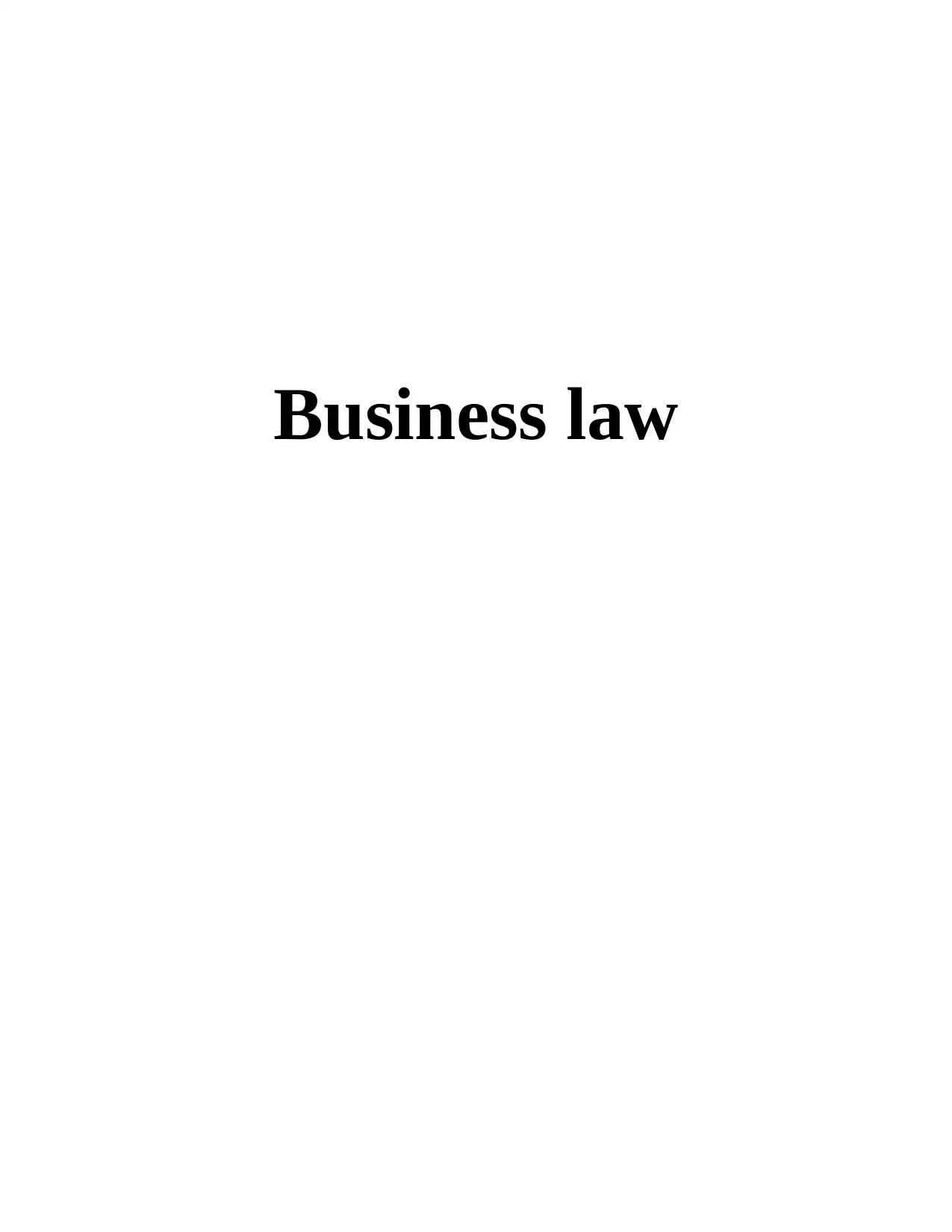
Business law
Paraphrase This Document
Need a fresh take? Get an instant paraphrase of this document with our AI Paraphraser
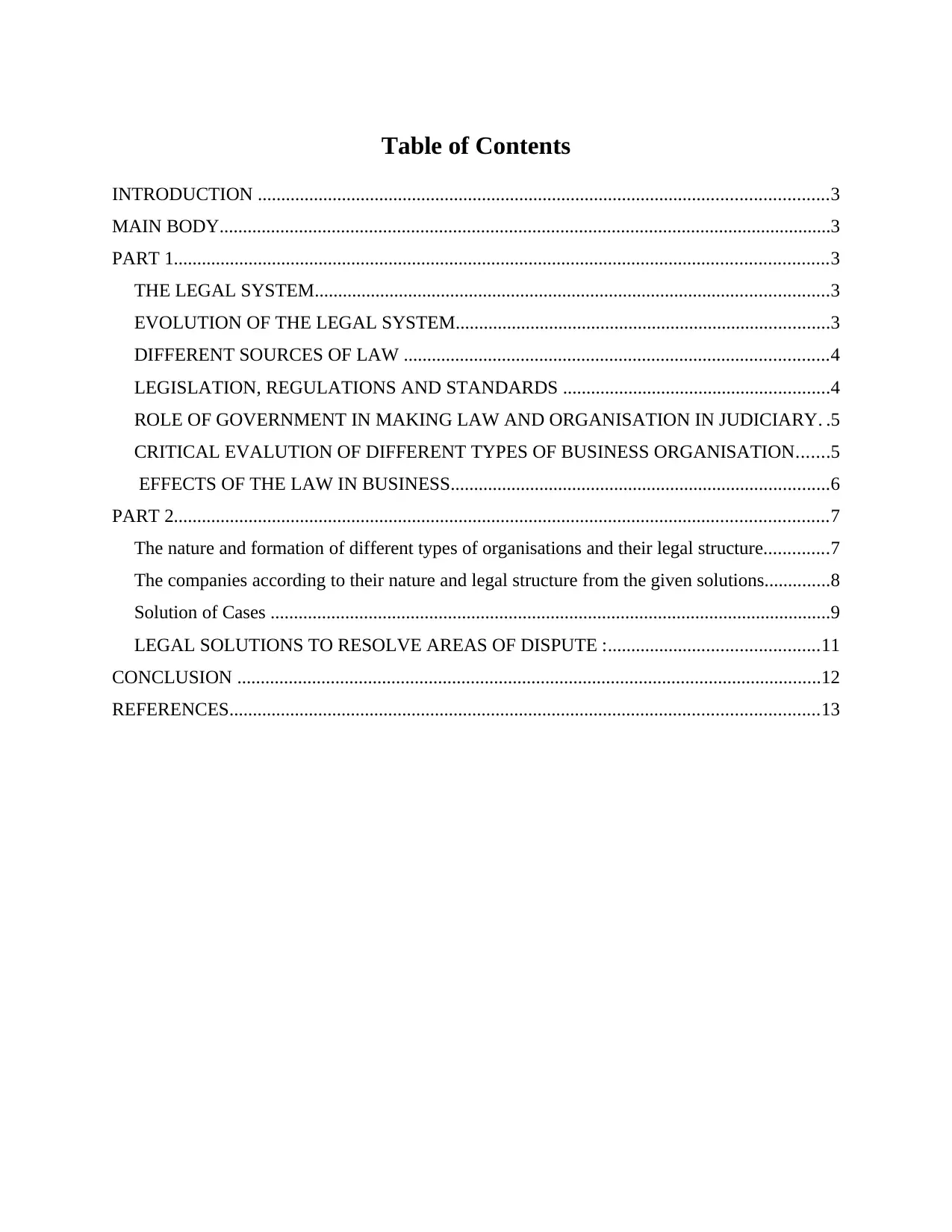
Table of Contents
INTRODUCTION ..........................................................................................................................3
MAIN BODY...................................................................................................................................3
PART 1............................................................................................................................................3
THE LEGAL SYSTEM..............................................................................................................3
EVOLUTION OF THE LEGAL SYSTEM................................................................................3
DIFFERENT SOURCES OF LAW ...........................................................................................4
LEGISLATION, REGULATIONS AND STANDARDS .........................................................4
ROLE OF GOVERNMENT IN MAKING LAW AND ORGANISATION IN JUDICIARY. .5
CRITICAL EVALUTION OF DIFFERENT TYPES OF BUSINESS ORGANISATION.......5
EFFECTS OF THE LAW IN BUSINESS.................................................................................6
PART 2............................................................................................................................................7
The nature and formation of different types of organisations and their legal structure..............7
The companies according to their nature and legal structure from the given solutions..............8
Solution of Cases ........................................................................................................................9
LEGAL SOLUTIONS TO RESOLVE AREAS OF DISPUTE :.............................................11
CONCLUSION .............................................................................................................................12
REFERENCES..............................................................................................................................13
INTRODUCTION ..........................................................................................................................3
MAIN BODY...................................................................................................................................3
PART 1............................................................................................................................................3
THE LEGAL SYSTEM..............................................................................................................3
EVOLUTION OF THE LEGAL SYSTEM................................................................................3
DIFFERENT SOURCES OF LAW ...........................................................................................4
LEGISLATION, REGULATIONS AND STANDARDS .........................................................4
ROLE OF GOVERNMENT IN MAKING LAW AND ORGANISATION IN JUDICIARY. .5
CRITICAL EVALUTION OF DIFFERENT TYPES OF BUSINESS ORGANISATION.......5
EFFECTS OF THE LAW IN BUSINESS.................................................................................6
PART 2............................................................................................................................................7
The nature and formation of different types of organisations and their legal structure..............7
The companies according to their nature and legal structure from the given solutions..............8
Solution of Cases ........................................................................................................................9
LEGAL SOLUTIONS TO RESOLVE AREAS OF DISPUTE :.............................................11
CONCLUSION .............................................................................................................................12
REFERENCES..............................................................................................................................13
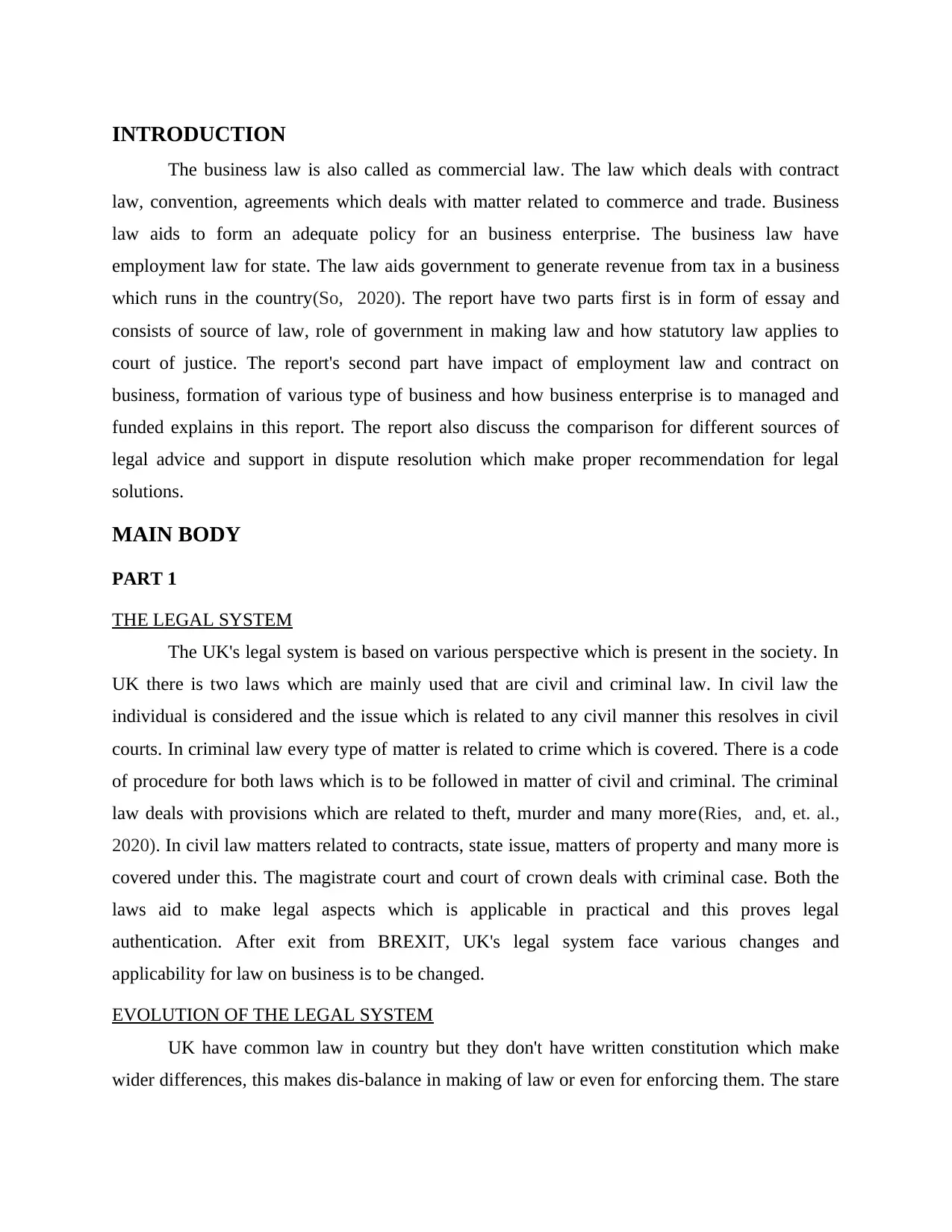
INTRODUCTION
The business law is also called as commercial law. The law which deals with contract
law, convention, agreements which deals with matter related to commerce and trade. Business
law aids to form an adequate policy for an business enterprise. The business law have
employment law for state. The law aids government to generate revenue from tax in a business
which runs in the country(So, 2020). The report have two parts first is in form of essay and
consists of source of law, role of government in making law and how statutory law applies to
court of justice. The report's second part have impact of employment law and contract on
business, formation of various type of business and how business enterprise is to managed and
funded explains in this report. The report also discuss the comparison for different sources of
legal advice and support in dispute resolution which make proper recommendation for legal
solutions.
MAIN BODY
PART 1
THE LEGAL SYSTEM
The UK's legal system is based on various perspective which is present in the society. In
UK there is two laws which are mainly used that are civil and criminal law. In civil law the
individual is considered and the issue which is related to any civil manner this resolves in civil
courts. In criminal law every type of matter is related to crime which is covered. There is a code
of procedure for both laws which is to be followed in matter of civil and criminal. The criminal
law deals with provisions which are related to theft, murder and many more(Ries, and, et. al.,
2020). In civil law matters related to contracts, state issue, matters of property and many more is
covered under this. The magistrate court and court of crown deals with criminal case. Both the
laws aid to make legal aspects which is applicable in practical and this proves legal
authentication. After exit from BREXIT, UK's legal system face various changes and
applicability for law on business is to be changed.
EVOLUTION OF THE LEGAL SYSTEM
UK have common law in country but they don't have written constitution which make
wider differences, this makes dis-balance in making of law or even for enforcing them. The stare
The business law is also called as commercial law. The law which deals with contract
law, convention, agreements which deals with matter related to commerce and trade. Business
law aids to form an adequate policy for an business enterprise. The business law have
employment law for state. The law aids government to generate revenue from tax in a business
which runs in the country(So, 2020). The report have two parts first is in form of essay and
consists of source of law, role of government in making law and how statutory law applies to
court of justice. The report's second part have impact of employment law and contract on
business, formation of various type of business and how business enterprise is to managed and
funded explains in this report. The report also discuss the comparison for different sources of
legal advice and support in dispute resolution which make proper recommendation for legal
solutions.
MAIN BODY
PART 1
THE LEGAL SYSTEM
The UK's legal system is based on various perspective which is present in the society. In
UK there is two laws which are mainly used that are civil and criminal law. In civil law the
individual is considered and the issue which is related to any civil manner this resolves in civil
courts. In criminal law every type of matter is related to crime which is covered. There is a code
of procedure for both laws which is to be followed in matter of civil and criminal. The criminal
law deals with provisions which are related to theft, murder and many more(Ries, and, et. al.,
2020). In civil law matters related to contracts, state issue, matters of property and many more is
covered under this. The magistrate court and court of crown deals with criminal case. Both the
laws aid to make legal aspects which is applicable in practical and this proves legal
authentication. After exit from BREXIT, UK's legal system face various changes and
applicability for law on business is to be changed.
EVOLUTION OF THE LEGAL SYSTEM
UK have common law in country but they don't have written constitution which make
wider differences, this makes dis-balance in making of law or even for enforcing them. The stare
⊘ This is a preview!⊘
Do you want full access?
Subscribe today to unlock all pages.

Trusted by 1+ million students worldwide
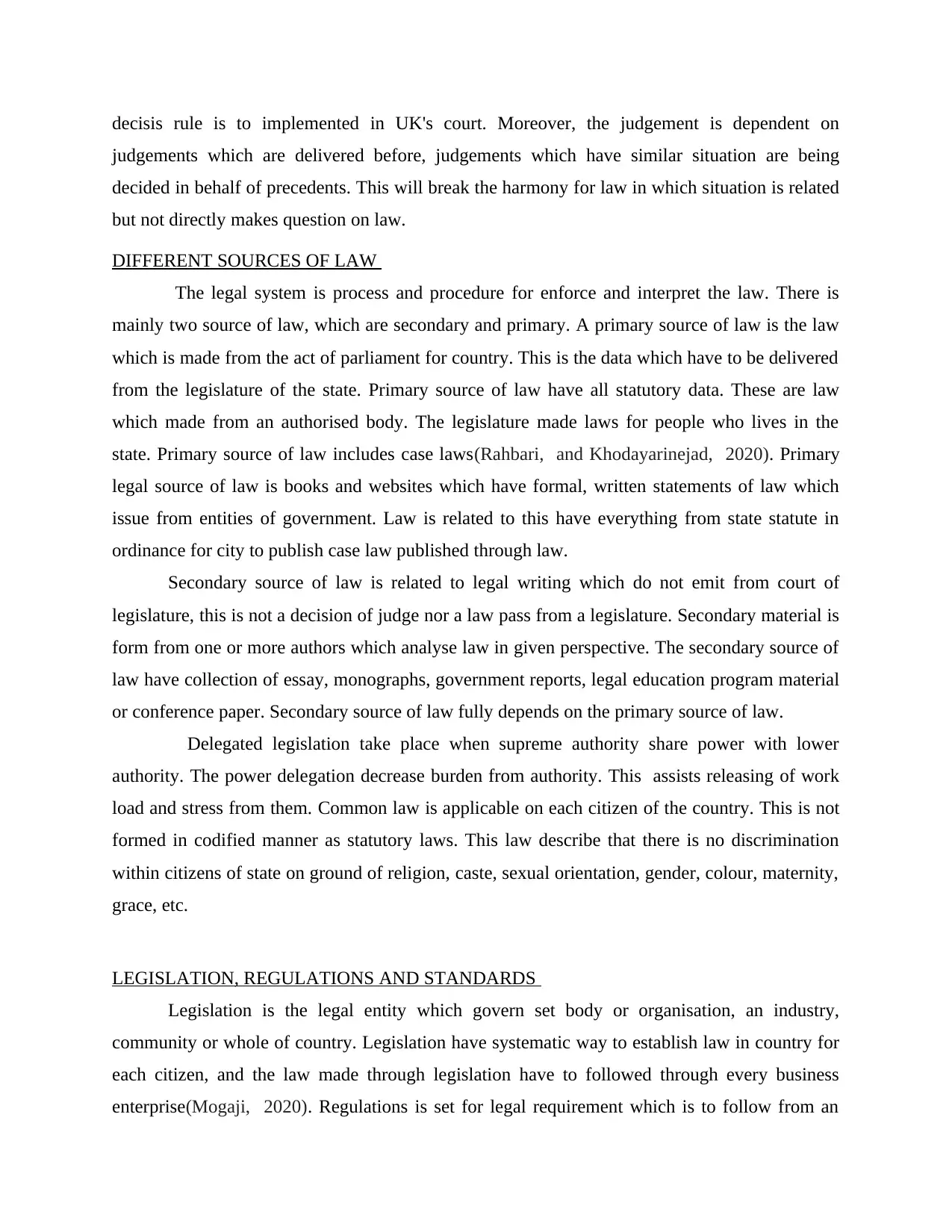
decisis rule is to implemented in UK's court. Moreover, the judgement is dependent on
judgements which are delivered before, judgements which have similar situation are being
decided in behalf of precedents. This will break the harmony for law in which situation is related
but not directly makes question on law.
DIFFERENT SOURCES OF LAW
The legal system is process and procedure for enforce and interpret the law. There is
mainly two source of law, which are secondary and primary. A primary source of law is the law
which is made from the act of parliament for country. This is the data which have to be delivered
from the legislature of the state. Primary source of law have all statutory data. These are law
which made from an authorised body. The legislature made laws for people who lives in the
state. Primary source of law includes case laws(Rahbari, and Khodayarinejad, 2020). Primary
legal source of law is books and websites which have formal, written statements of law which
issue from entities of government. Law is related to this have everything from state statute in
ordinance for city to publish case law published through law.
Secondary source of law is related to legal writing which do not emit from court of
legislature, this is not a decision of judge nor a law pass from a legislature. Secondary material is
form from one or more authors which analyse law in given perspective. The secondary source of
law have collection of essay, monographs, government reports, legal education program material
or conference paper. Secondary source of law fully depends on the primary source of law.
Delegated legislation take place when supreme authority share power with lower
authority. The power delegation decrease burden from authority. This assists releasing of work
load and stress from them. Common law is applicable on each citizen of the country. This is not
formed in codified manner as statutory laws. This law describe that there is no discrimination
within citizens of state on ground of religion, caste, sexual orientation, gender, colour, maternity,
grace, etc.
LEGISLATION, REGULATIONS AND STANDARDS
Legislation is the legal entity which govern set body or organisation, an industry,
community or whole of country. Legislation have systematic way to establish law in country for
each citizen, and the law made through legislation have to followed through every business
enterprise(Mogaji, 2020). Regulations is set for legal requirement which is to follow from an
judgements which are delivered before, judgements which have similar situation are being
decided in behalf of precedents. This will break the harmony for law in which situation is related
but not directly makes question on law.
DIFFERENT SOURCES OF LAW
The legal system is process and procedure for enforce and interpret the law. There is
mainly two source of law, which are secondary and primary. A primary source of law is the law
which is made from the act of parliament for country. This is the data which have to be delivered
from the legislature of the state. Primary source of law have all statutory data. These are law
which made from an authorised body. The legislature made laws for people who lives in the
state. Primary source of law includes case laws(Rahbari, and Khodayarinejad, 2020). Primary
legal source of law is books and websites which have formal, written statements of law which
issue from entities of government. Law is related to this have everything from state statute in
ordinance for city to publish case law published through law.
Secondary source of law is related to legal writing which do not emit from court of
legislature, this is not a decision of judge nor a law pass from a legislature. Secondary material is
form from one or more authors which analyse law in given perspective. The secondary source of
law have collection of essay, monographs, government reports, legal education program material
or conference paper. Secondary source of law fully depends on the primary source of law.
Delegated legislation take place when supreme authority share power with lower
authority. The power delegation decrease burden from authority. This assists releasing of work
load and stress from them. Common law is applicable on each citizen of the country. This is not
formed in codified manner as statutory laws. This law describe that there is no discrimination
within citizens of state on ground of religion, caste, sexual orientation, gender, colour, maternity,
grace, etc.
LEGISLATION, REGULATIONS AND STANDARDS
Legislation is the legal entity which govern set body or organisation, an industry,
community or whole of country. Legislation have systematic way to establish law in country for
each citizen, and the law made through legislation have to followed through every business
enterprise(Mogaji, 2020). Regulations is set for legal requirement which is to follow from an
Paraphrase This Document
Need a fresh take? Get an instant paraphrase of this document with our AI Paraphraser
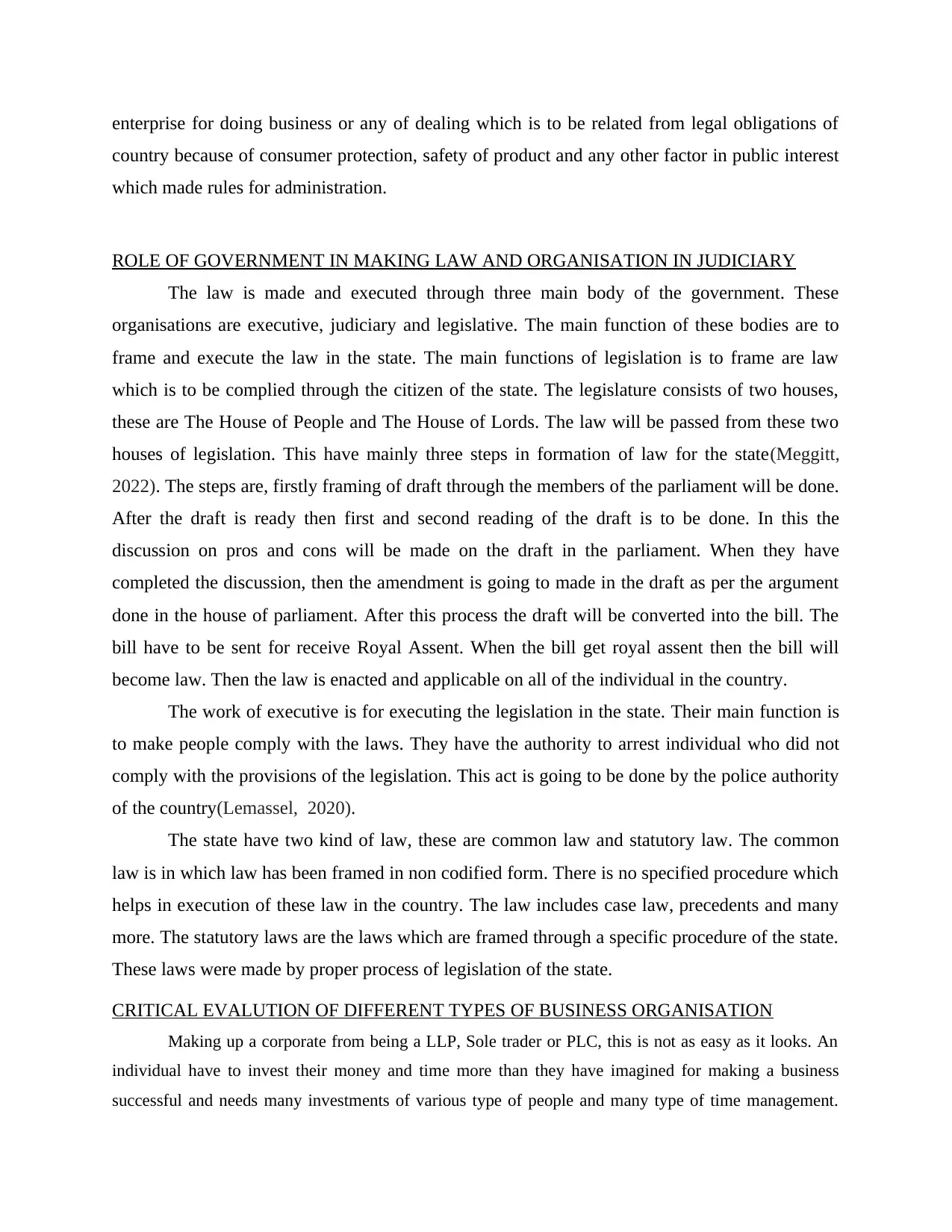
enterprise for doing business or any of dealing which is to be related from legal obligations of
country because of consumer protection, safety of product and any other factor in public interest
which made rules for administration.
ROLE OF GOVERNMENT IN MAKING LAW AND ORGANISATION IN JUDICIARY
The law is made and executed through three main body of the government. These
organisations are executive, judiciary and legislative. The main function of these bodies are to
frame and execute the law in the state. The main functions of legislation is to frame are law
which is to be complied through the citizen of the state. The legislature consists of two houses,
these are The House of People and The House of Lords. The law will be passed from these two
houses of legislation. This have mainly three steps in formation of law for the state(Meggitt,
2022). The steps are, firstly framing of draft through the members of the parliament will be done.
After the draft is ready then first and second reading of the draft is to be done. In this the
discussion on pros and cons will be made on the draft in the parliament. When they have
completed the discussion, then the amendment is going to made in the draft as per the argument
done in the house of parliament. After this process the draft will be converted into the bill. The
bill have to be sent for receive Royal Assent. When the bill get royal assent then the bill will
become law. Then the law is enacted and applicable on all of the individual in the country.
The work of executive is for executing the legislation in the state. Their main function is
to make people comply with the laws. They have the authority to arrest individual who did not
comply with the provisions of the legislation. This act is going to be done by the police authority
of the country(Lemassel, 2020).
The state have two kind of law, these are common law and statutory law. The common
law is in which law has been framed in non codified form. There is no specified procedure which
helps in execution of these law in the country. The law includes case law, precedents and many
more. The statutory laws are the laws which are framed through a specific procedure of the state.
These laws were made by proper process of legislation of the state.
CRITICAL EVALUTION OF DIFFERENT TYPES OF BUSINESS ORGANISATION
Making up a corporate from being a LLP, Sole trader or PLC, this is not as easy as it looks. An
individual have to invest their money and time more than they have imagined for making a business
successful and needs many investments of various type of people and many type of time management.
country because of consumer protection, safety of product and any other factor in public interest
which made rules for administration.
ROLE OF GOVERNMENT IN MAKING LAW AND ORGANISATION IN JUDICIARY
The law is made and executed through three main body of the government. These
organisations are executive, judiciary and legislative. The main function of these bodies are to
frame and execute the law in the state. The main functions of legislation is to frame are law
which is to be complied through the citizen of the state. The legislature consists of two houses,
these are The House of People and The House of Lords. The law will be passed from these two
houses of legislation. This have mainly three steps in formation of law for the state(Meggitt,
2022). The steps are, firstly framing of draft through the members of the parliament will be done.
After the draft is ready then first and second reading of the draft is to be done. In this the
discussion on pros and cons will be made on the draft in the parliament. When they have
completed the discussion, then the amendment is going to made in the draft as per the argument
done in the house of parliament. After this process the draft will be converted into the bill. The
bill have to be sent for receive Royal Assent. When the bill get royal assent then the bill will
become law. Then the law is enacted and applicable on all of the individual in the country.
The work of executive is for executing the legislation in the state. Their main function is
to make people comply with the laws. They have the authority to arrest individual who did not
comply with the provisions of the legislation. This act is going to be done by the police authority
of the country(Lemassel, 2020).
The state have two kind of law, these are common law and statutory law. The common
law is in which law has been framed in non codified form. There is no specified procedure which
helps in execution of these law in the country. The law includes case law, precedents and many
more. The statutory laws are the laws which are framed through a specific procedure of the state.
These laws were made by proper process of legislation of the state.
CRITICAL EVALUTION OF DIFFERENT TYPES OF BUSINESS ORGANISATION
Making up a corporate from being a LLP, Sole trader or PLC, this is not as easy as it looks. An
individual have to invest their money and time more than they have imagined for making a business
successful and needs many investments of various type of people and many type of time management.
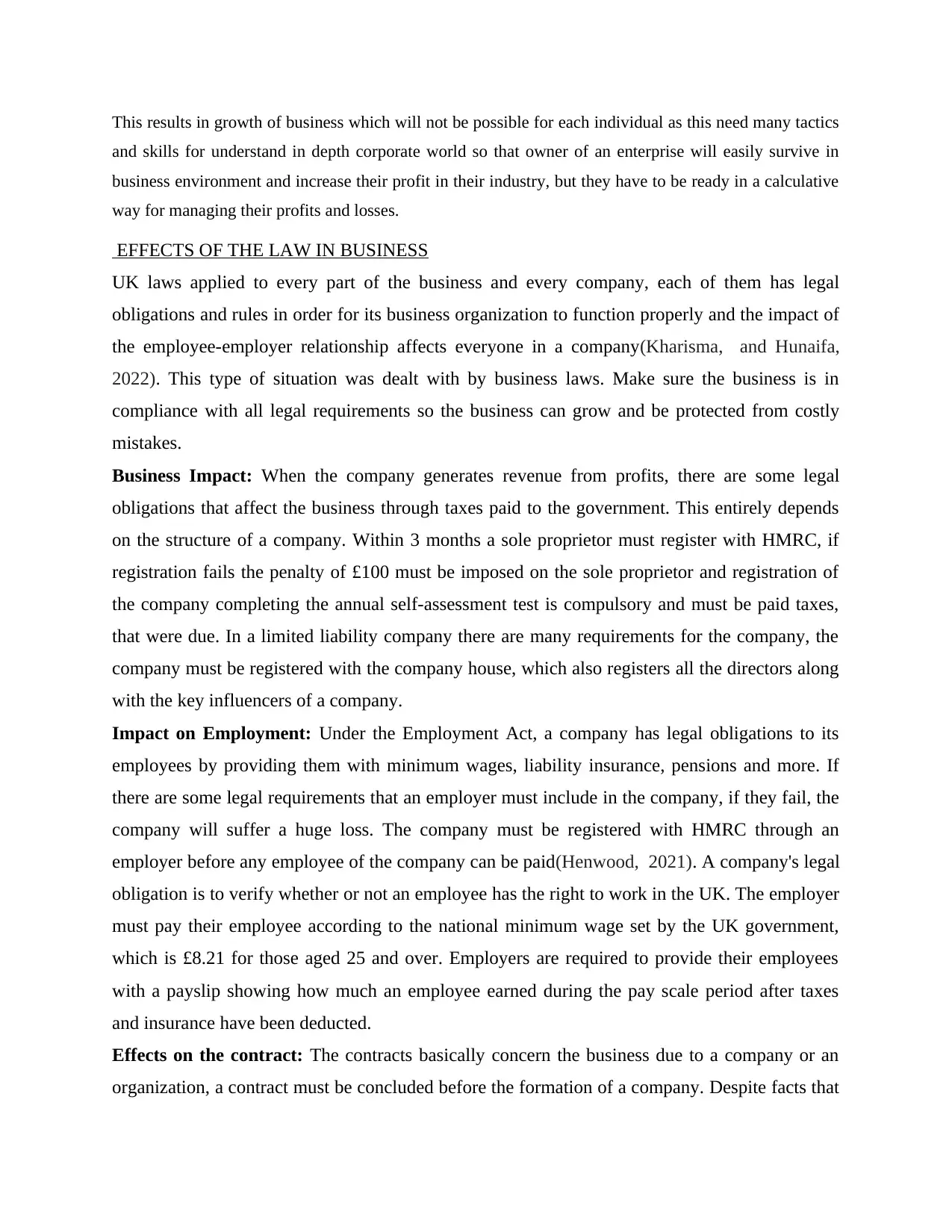
This results in growth of business which will not be possible for each individual as this need many tactics
and skills for understand in depth corporate world so that owner of an enterprise will easily survive in
business environment and increase their profit in their industry, but they have to be ready in a calculative
way for managing their profits and losses.
EFFECTS OF THE LAW IN BUSINESS
UK laws applied to every part of the business and every company, each of them has legal
obligations and rules in order for its business organization to function properly and the impact of
the employee-employer relationship affects everyone in a company(Kharisma, and Hunaifa,
2022). This type of situation was dealt with by business laws. Make sure the business is in
compliance with all legal requirements so the business can grow and be protected from costly
mistakes.
Business Impact: When the company generates revenue from profits, there are some legal
obligations that affect the business through taxes paid to the government. This entirely depends
on the structure of a company. Within 3 months a sole proprietor must register with HMRC, if
registration fails the penalty of £100 must be imposed on the sole proprietor and registration of
the company completing the annual self-assessment test is compulsory and must be paid taxes,
that were due. In a limited liability company there are many requirements for the company, the
company must be registered with the company house, which also registers all the directors along
with the key influencers of a company.
Impact on Employment: Under the Employment Act, a company has legal obligations to its
employees by providing them with minimum wages, liability insurance, pensions and more. If
there are some legal requirements that an employer must include in the company, if they fail, the
company will suffer a huge loss. The company must be registered with HMRC through an
employer before any employee of the company can be paid(Henwood, 2021). A company's legal
obligation is to verify whether or not an employee has the right to work in the UK. The employer
must pay their employee according to the national minimum wage set by the UK government,
which is £8.21 for those aged 25 and over. Employers are required to provide their employees
with a payslip showing how much an employee earned during the pay scale period after taxes
and insurance have been deducted.
Effects on the contract: The contracts basically concern the business due to a company or an
organization, a contract must be concluded before the formation of a company. Despite facts that
and skills for understand in depth corporate world so that owner of an enterprise will easily survive in
business environment and increase their profit in their industry, but they have to be ready in a calculative
way for managing their profits and losses.
EFFECTS OF THE LAW IN BUSINESS
UK laws applied to every part of the business and every company, each of them has legal
obligations and rules in order for its business organization to function properly and the impact of
the employee-employer relationship affects everyone in a company(Kharisma, and Hunaifa,
2022). This type of situation was dealt with by business laws. Make sure the business is in
compliance with all legal requirements so the business can grow and be protected from costly
mistakes.
Business Impact: When the company generates revenue from profits, there are some legal
obligations that affect the business through taxes paid to the government. This entirely depends
on the structure of a company. Within 3 months a sole proprietor must register with HMRC, if
registration fails the penalty of £100 must be imposed on the sole proprietor and registration of
the company completing the annual self-assessment test is compulsory and must be paid taxes,
that were due. In a limited liability company there are many requirements for the company, the
company must be registered with the company house, which also registers all the directors along
with the key influencers of a company.
Impact on Employment: Under the Employment Act, a company has legal obligations to its
employees by providing them with minimum wages, liability insurance, pensions and more. If
there are some legal requirements that an employer must include in the company, if they fail, the
company will suffer a huge loss. The company must be registered with HMRC through an
employer before any employee of the company can be paid(Henwood, 2021). A company's legal
obligation is to verify whether or not an employee has the right to work in the UK. The employer
must pay their employee according to the national minimum wage set by the UK government,
which is £8.21 for those aged 25 and over. Employers are required to provide their employees
with a payslip showing how much an employee earned during the pay scale period after taxes
and insurance have been deducted.
Effects on the contract: The contracts basically concern the business due to a company or an
organization, a contract must be concluded before the formation of a company. Despite facts that
⊘ This is a preview!⊘
Do you want full access?
Subscribe today to unlock all pages.

Trusted by 1+ million students worldwide
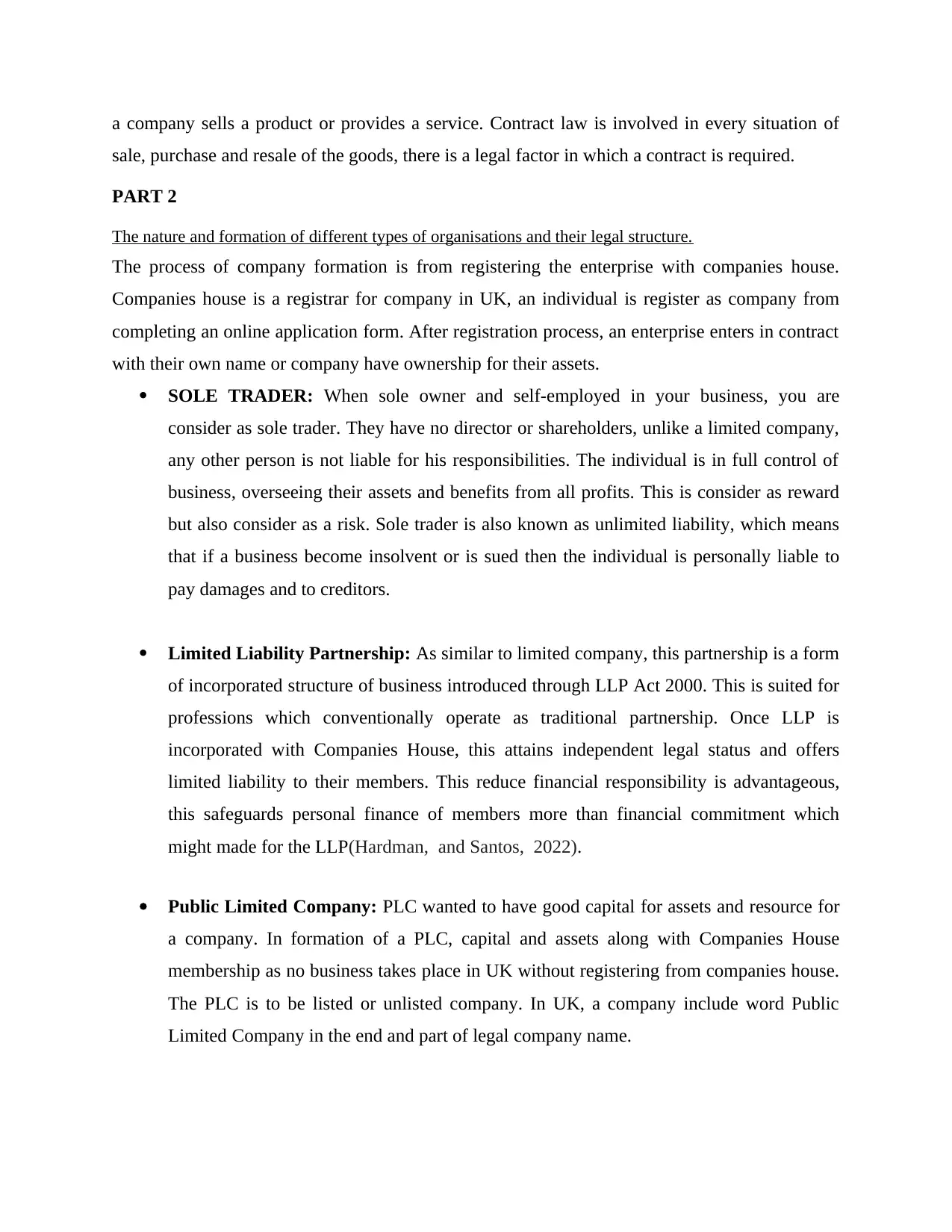
a company sells a product or provides a service. Contract law is involved in every situation of
sale, purchase and resale of the goods, there is a legal factor in which a contract is required.
PART 2
The nature and formation of different types of organisations and their legal structure.
The process of company formation is from registering the enterprise with companies house.
Companies house is a registrar for company in UK, an individual is register as company from
completing an online application form. After registration process, an enterprise enters in contract
with their own name or company have ownership for their assets.
SOLE TRADER: When sole owner and self-employed in your business, you are
consider as sole trader. They have no director or shareholders, unlike a limited company,
any other person is not liable for his responsibilities. The individual is in full control of
business, overseeing their assets and benefits from all profits. This is consider as reward
but also consider as a risk. Sole trader is also known as unlimited liability, which means
that if a business become insolvent or is sued then the individual is personally liable to
pay damages and to creditors.
Limited Liability Partnership: As similar to limited company, this partnership is a form
of incorporated structure of business introduced through LLP Act 2000. This is suited for
professions which conventionally operate as traditional partnership. Once LLP is
incorporated with Companies House, this attains independent legal status and offers
limited liability to their members. This reduce financial responsibility is advantageous,
this safeguards personal finance of members more than financial commitment which
might made for the LLP(Hardman, and Santos, 2022).
Public Limited Company: PLC wanted to have good capital for assets and resource for
a company. In formation of a PLC, capital and assets along with Companies House
membership as no business takes place in UK without registering from companies house.
The PLC is to be listed or unlisted company. In UK, a company include word Public
Limited Company in the end and part of legal company name.
sale, purchase and resale of the goods, there is a legal factor in which a contract is required.
PART 2
The nature and formation of different types of organisations and their legal structure.
The process of company formation is from registering the enterprise with companies house.
Companies house is a registrar for company in UK, an individual is register as company from
completing an online application form. After registration process, an enterprise enters in contract
with their own name or company have ownership for their assets.
SOLE TRADER: When sole owner and self-employed in your business, you are
consider as sole trader. They have no director or shareholders, unlike a limited company,
any other person is not liable for his responsibilities. The individual is in full control of
business, overseeing their assets and benefits from all profits. This is consider as reward
but also consider as a risk. Sole trader is also known as unlimited liability, which means
that if a business become insolvent or is sued then the individual is personally liable to
pay damages and to creditors.
Limited Liability Partnership: As similar to limited company, this partnership is a form
of incorporated structure of business introduced through LLP Act 2000. This is suited for
professions which conventionally operate as traditional partnership. Once LLP is
incorporated with Companies House, this attains independent legal status and offers
limited liability to their members. This reduce financial responsibility is advantageous,
this safeguards personal finance of members more than financial commitment which
might made for the LLP(Hardman, and Santos, 2022).
Public Limited Company: PLC wanted to have good capital for assets and resource for
a company. In formation of a PLC, capital and assets along with Companies House
membership as no business takes place in UK without registering from companies house.
The PLC is to be listed or unlisted company. In UK, a company include word Public
Limited Company in the end and part of legal company name.
Paraphrase This Document
Need a fresh take? Get an instant paraphrase of this document with our AI Paraphraser
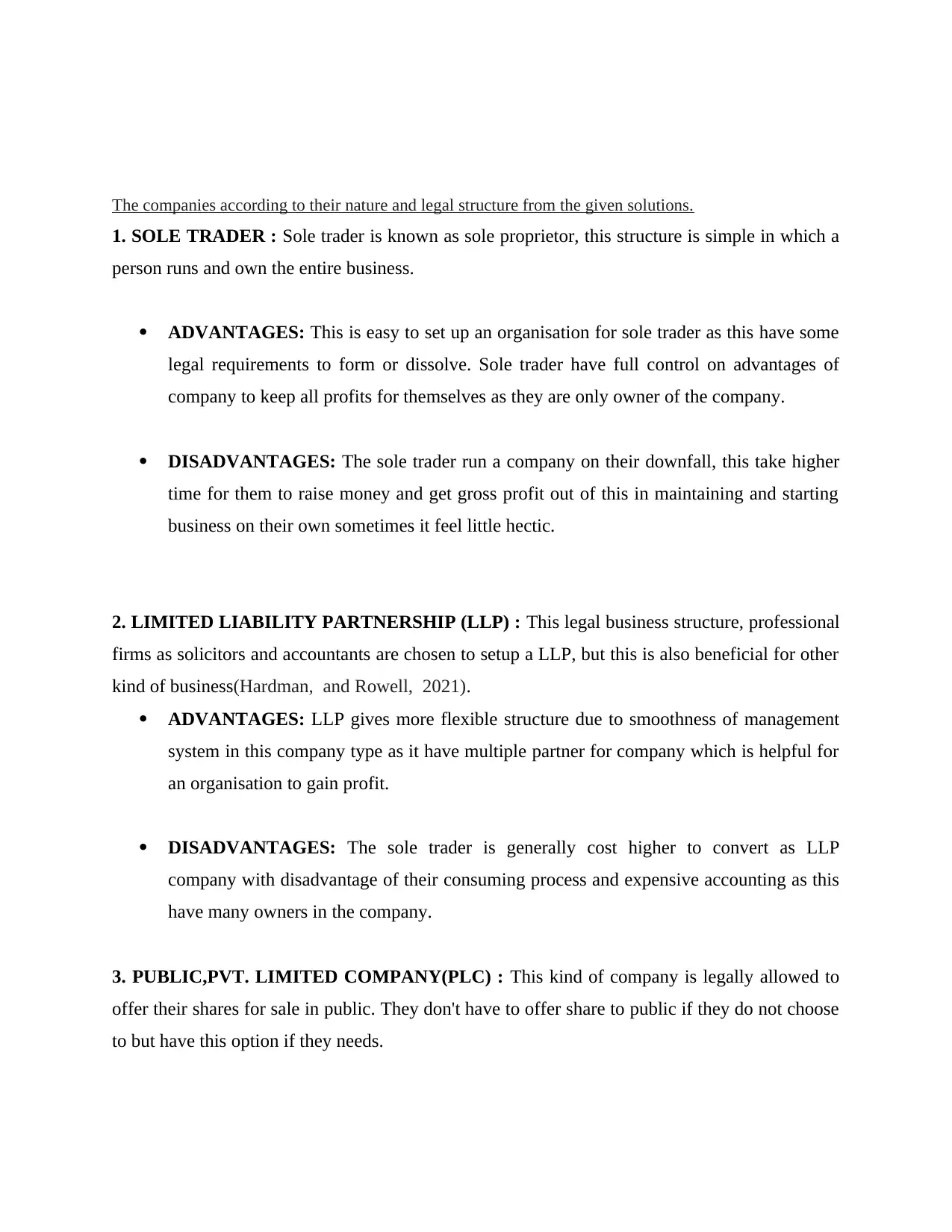
The companies according to their nature and legal structure from the given solutions.
1. SOLE TRADER : Sole trader is known as sole proprietor, this structure is simple in which a
person runs and own the entire business.
ADVANTAGES: This is easy to set up an organisation for sole trader as this have some
legal requirements to form or dissolve. Sole trader have full control on advantages of
company to keep all profits for themselves as they are only owner of the company.
DISADVANTAGES: The sole trader run a company on their downfall, this take higher
time for them to raise money and get gross profit out of this in maintaining and starting
business on their own sometimes it feel little hectic.
2. LIMITED LIABILITY PARTNERSHIP (LLP) : This legal business structure, professional
firms as solicitors and accountants are chosen to setup a LLP, but this is also beneficial for other
kind of business(Hardman, and Rowell, 2021).
ADVANTAGES: LLP gives more flexible structure due to smoothness of management
system in this company type as it have multiple partner for company which is helpful for
an organisation to gain profit.
DISADVANTAGES: The sole trader is generally cost higher to convert as LLP
company with disadvantage of their consuming process and expensive accounting as this
have many owners in the company.
3. PUBLIC,PVT. LIMITED COMPANY(PLC) : This kind of company is legally allowed to
offer their shares for sale in public. They don't have to offer share to public if they do not choose
to but have this option if they needs.
1. SOLE TRADER : Sole trader is known as sole proprietor, this structure is simple in which a
person runs and own the entire business.
ADVANTAGES: This is easy to set up an organisation for sole trader as this have some
legal requirements to form or dissolve. Sole trader have full control on advantages of
company to keep all profits for themselves as they are only owner of the company.
DISADVANTAGES: The sole trader run a company on their downfall, this take higher
time for them to raise money and get gross profit out of this in maintaining and starting
business on their own sometimes it feel little hectic.
2. LIMITED LIABILITY PARTNERSHIP (LLP) : This legal business structure, professional
firms as solicitors and accountants are chosen to setup a LLP, but this is also beneficial for other
kind of business(Hardman, and Rowell, 2021).
ADVANTAGES: LLP gives more flexible structure due to smoothness of management
system in this company type as it have multiple partner for company which is helpful for
an organisation to gain profit.
DISADVANTAGES: The sole trader is generally cost higher to convert as LLP
company with disadvantage of their consuming process and expensive accounting as this
have many owners in the company.
3. PUBLIC,PVT. LIMITED COMPANY(PLC) : This kind of company is legally allowed to
offer their shares for sale in public. They don't have to offer share to public if they do not choose
to but have this option if they needs.
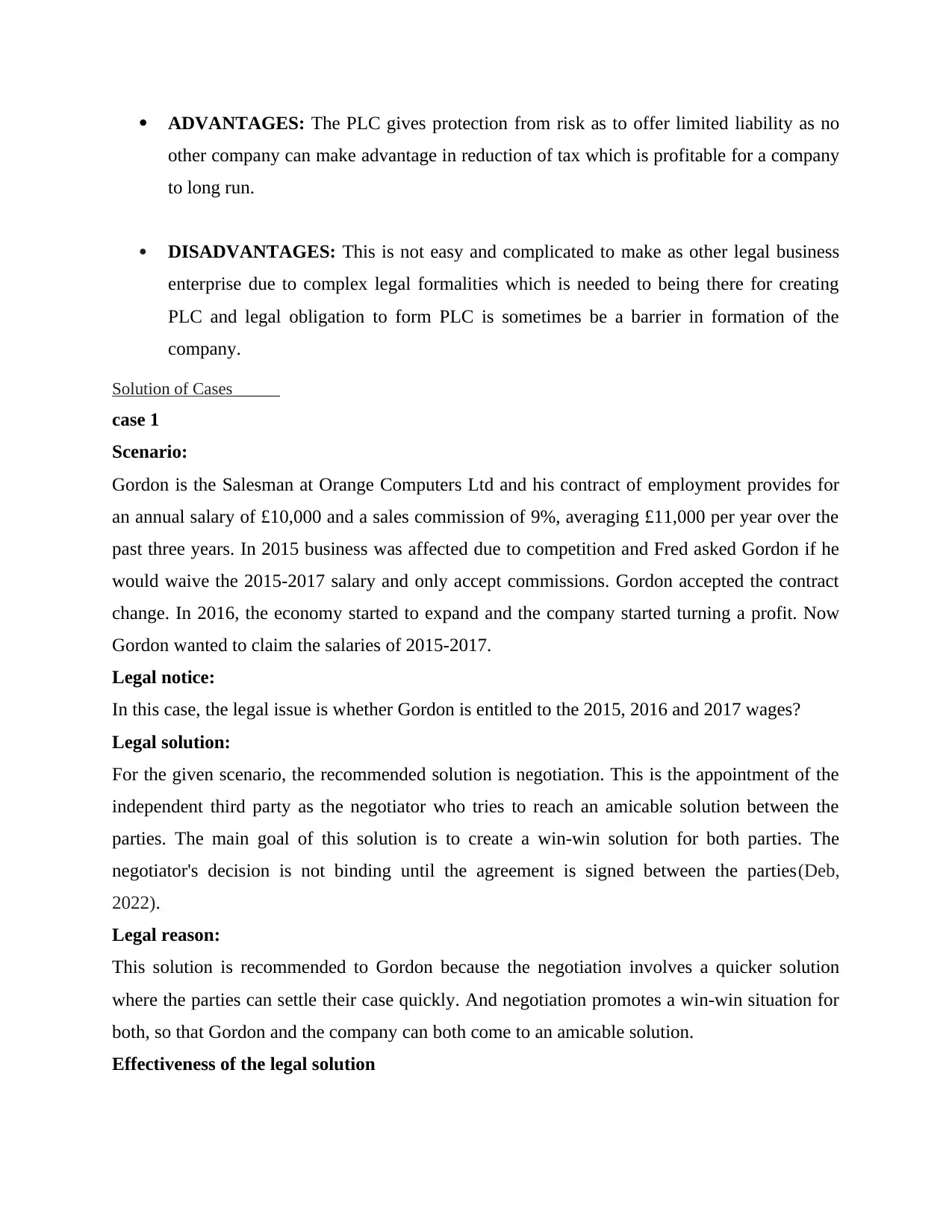
ADVANTAGES: The PLC gives protection from risk as to offer limited liability as no
other company can make advantage in reduction of tax which is profitable for a company
to long run.
DISADVANTAGES: This is not easy and complicated to make as other legal business
enterprise due to complex legal formalities which is needed to being there for creating
PLC and legal obligation to form PLC is sometimes be a barrier in formation of the
company.
Solution of Cases
case 1
Scenario:
Gordon is the Salesman at Orange Computers Ltd and his contract of employment provides for
an annual salary of £10,000 and a sales commission of 9%, averaging £11,000 per year over the
past three years. In 2015 business was affected due to competition and Fred asked Gordon if he
would waive the 2015-2017 salary and only accept commissions. Gordon accepted the contract
change. In 2016, the economy started to expand and the company started turning a profit. Now
Gordon wanted to claim the salaries of 2015-2017.
Legal notice:
In this case, the legal issue is whether Gordon is entitled to the 2015, 2016 and 2017 wages?
Legal solution:
For the given scenario, the recommended solution is negotiation. This is the appointment of the
independent third party as the negotiator who tries to reach an amicable solution between the
parties. The main goal of this solution is to create a win-win solution for both parties. The
negotiator's decision is not binding until the agreement is signed between the parties(Deb,
2022).
Legal reason:
This solution is recommended to Gordon because the negotiation involves a quicker solution
where the parties can settle their case quickly. And negotiation promotes a win-win situation for
both, so that Gordon and the company can both come to an amicable solution.
Effectiveness of the legal solution
other company can make advantage in reduction of tax which is profitable for a company
to long run.
DISADVANTAGES: This is not easy and complicated to make as other legal business
enterprise due to complex legal formalities which is needed to being there for creating
PLC and legal obligation to form PLC is sometimes be a barrier in formation of the
company.
Solution of Cases
case 1
Scenario:
Gordon is the Salesman at Orange Computers Ltd and his contract of employment provides for
an annual salary of £10,000 and a sales commission of 9%, averaging £11,000 per year over the
past three years. In 2015 business was affected due to competition and Fred asked Gordon if he
would waive the 2015-2017 salary and only accept commissions. Gordon accepted the contract
change. In 2016, the economy started to expand and the company started turning a profit. Now
Gordon wanted to claim the salaries of 2015-2017.
Legal notice:
In this case, the legal issue is whether Gordon is entitled to the 2015, 2016 and 2017 wages?
Legal solution:
For the given scenario, the recommended solution is negotiation. This is the appointment of the
independent third party as the negotiator who tries to reach an amicable solution between the
parties. The main goal of this solution is to create a win-win solution for both parties. The
negotiator's decision is not binding until the agreement is signed between the parties(Deb,
2022).
Legal reason:
This solution is recommended to Gordon because the negotiation involves a quicker solution
where the parties can settle their case quickly. And negotiation promotes a win-win situation for
both, so that Gordon and the company can both come to an amicable solution.
Effectiveness of the legal solution
⊘ This is a preview!⊘
Do you want full access?
Subscribe today to unlock all pages.

Trusted by 1+ million students worldwide
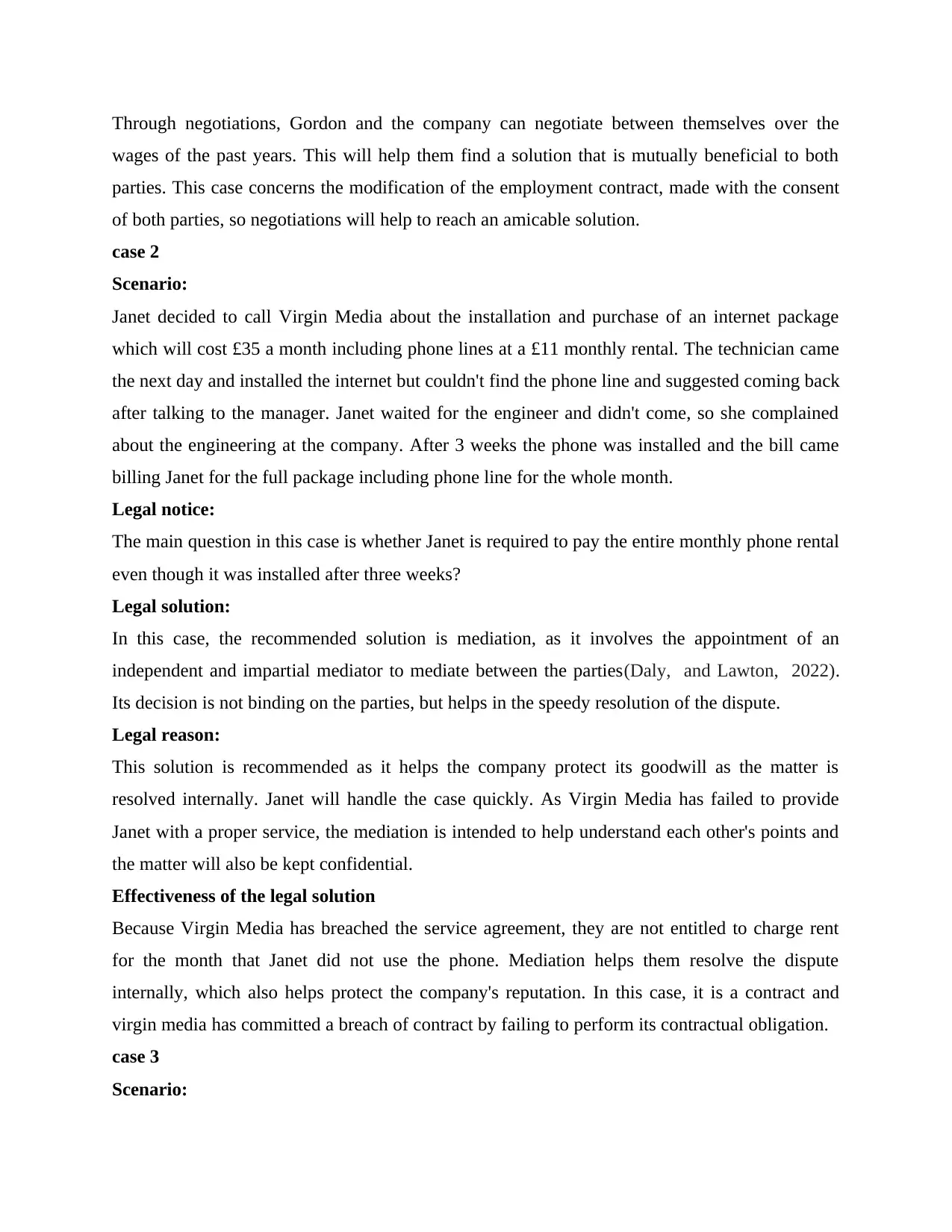
Through negotiations, Gordon and the company can negotiate between themselves over the
wages of the past years. This will help them find a solution that is mutually beneficial to both
parties. This case concerns the modification of the employment contract, made with the consent
of both parties, so negotiations will help to reach an amicable solution.
case 2
Scenario:
Janet decided to call Virgin Media about the installation and purchase of an internet package
which will cost £35 a month including phone lines at a £11 monthly rental. The technician came
the next day and installed the internet but couldn't find the phone line and suggested coming back
after talking to the manager. Janet waited for the engineer and didn't come, so she complained
about the engineering at the company. After 3 weeks the phone was installed and the bill came
billing Janet for the full package including phone line for the whole month.
Legal notice:
The main question in this case is whether Janet is required to pay the entire monthly phone rental
even though it was installed after three weeks?
Legal solution:
In this case, the recommended solution is mediation, as it involves the appointment of an
independent and impartial mediator to mediate between the parties(Daly, and Lawton, 2022).
Its decision is not binding on the parties, but helps in the speedy resolution of the dispute.
Legal reason:
This solution is recommended as it helps the company protect its goodwill as the matter is
resolved internally. Janet will handle the case quickly. As Virgin Media has failed to provide
Janet with a proper service, the mediation is intended to help understand each other's points and
the matter will also be kept confidential.
Effectiveness of the legal solution
Because Virgin Media has breached the service agreement, they are not entitled to charge rent
for the month that Janet did not use the phone. Mediation helps them resolve the dispute
internally, which also helps protect the company's reputation. In this case, it is a contract and
virgin media has committed a breach of contract by failing to perform its contractual obligation.
case 3
Scenario:
wages of the past years. This will help them find a solution that is mutually beneficial to both
parties. This case concerns the modification of the employment contract, made with the consent
of both parties, so negotiations will help to reach an amicable solution.
case 2
Scenario:
Janet decided to call Virgin Media about the installation and purchase of an internet package
which will cost £35 a month including phone lines at a £11 monthly rental. The technician came
the next day and installed the internet but couldn't find the phone line and suggested coming back
after talking to the manager. Janet waited for the engineer and didn't come, so she complained
about the engineering at the company. After 3 weeks the phone was installed and the bill came
billing Janet for the full package including phone line for the whole month.
Legal notice:
The main question in this case is whether Janet is required to pay the entire monthly phone rental
even though it was installed after three weeks?
Legal solution:
In this case, the recommended solution is mediation, as it involves the appointment of an
independent and impartial mediator to mediate between the parties(Daly, and Lawton, 2022).
Its decision is not binding on the parties, but helps in the speedy resolution of the dispute.
Legal reason:
This solution is recommended as it helps the company protect its goodwill as the matter is
resolved internally. Janet will handle the case quickly. As Virgin Media has failed to provide
Janet with a proper service, the mediation is intended to help understand each other's points and
the matter will also be kept confidential.
Effectiveness of the legal solution
Because Virgin Media has breached the service agreement, they are not entitled to charge rent
for the month that Janet did not use the phone. Mediation helps them resolve the dispute
internally, which also helps protect the company's reputation. In this case, it is a contract and
virgin media has committed a breach of contract by failing to perform its contractual obligation.
case 3
Scenario:
Paraphrase This Document
Need a fresh take? Get an instant paraphrase of this document with our AI Paraphraser
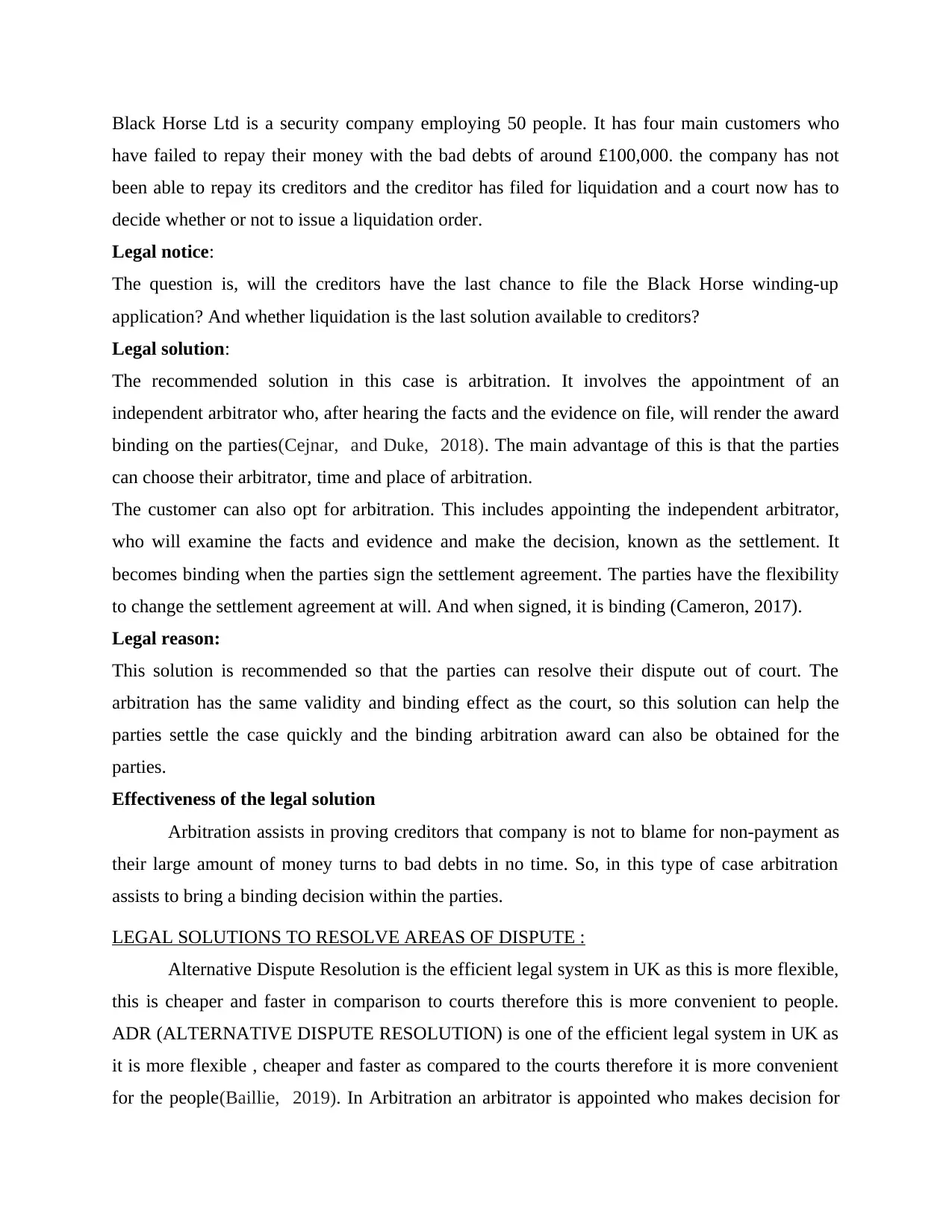
Black Horse Ltd is a security company employing 50 people. It has four main customers who
have failed to repay their money with the bad debts of around £100,000. the company has not
been able to repay its creditors and the creditor has filed for liquidation and a court now has to
decide whether or not to issue a liquidation order.
Legal notice:
The question is, will the creditors have the last chance to file the Black Horse winding-up
application? And whether liquidation is the last solution available to creditors?
Legal solution:
The recommended solution in this case is arbitration. It involves the appointment of an
independent arbitrator who, after hearing the facts and the evidence on file, will render the award
binding on the parties(Cejnar, and Duke, 2018). The main advantage of this is that the parties
can choose their arbitrator, time and place of arbitration.
The customer can also opt for arbitration. This includes appointing the independent arbitrator,
who will examine the facts and evidence and make the decision, known as the settlement. It
becomes binding when the parties sign the settlement agreement. The parties have the flexibility
to change the settlement agreement at will. And when signed, it is binding (Cameron, 2017).
Legal reason:
This solution is recommended so that the parties can resolve their dispute out of court. The
arbitration has the same validity and binding effect as the court, so this solution can help the
parties settle the case quickly and the binding arbitration award can also be obtained for the
parties.
Effectiveness of the legal solution
Arbitration assists in proving creditors that company is not to blame for non-payment as
their large amount of money turns to bad debts in no time. So, in this type of case arbitration
assists to bring a binding decision within the parties.
LEGAL SOLUTIONS TO RESOLVE AREAS OF DISPUTE :
Alternative Dispute Resolution is the efficient legal system in UK as this is more flexible,
this is cheaper and faster in comparison to courts therefore this is more convenient to people.
ADR (ALTERNATIVE DISPUTE RESOLUTION) is one of the efficient legal system in UK as
it is more flexible , cheaper and faster as compared to the courts therefore it is more convenient
for the people(Baillie, 2019). In Arbitration an arbitrator is appointed who makes decision for
have failed to repay their money with the bad debts of around £100,000. the company has not
been able to repay its creditors and the creditor has filed for liquidation and a court now has to
decide whether or not to issue a liquidation order.
Legal notice:
The question is, will the creditors have the last chance to file the Black Horse winding-up
application? And whether liquidation is the last solution available to creditors?
Legal solution:
The recommended solution in this case is arbitration. It involves the appointment of an
independent arbitrator who, after hearing the facts and the evidence on file, will render the award
binding on the parties(Cejnar, and Duke, 2018). The main advantage of this is that the parties
can choose their arbitrator, time and place of arbitration.
The customer can also opt for arbitration. This includes appointing the independent arbitrator,
who will examine the facts and evidence and make the decision, known as the settlement. It
becomes binding when the parties sign the settlement agreement. The parties have the flexibility
to change the settlement agreement at will. And when signed, it is binding (Cameron, 2017).
Legal reason:
This solution is recommended so that the parties can resolve their dispute out of court. The
arbitration has the same validity and binding effect as the court, so this solution can help the
parties settle the case quickly and the binding arbitration award can also be obtained for the
parties.
Effectiveness of the legal solution
Arbitration assists in proving creditors that company is not to blame for non-payment as
their large amount of money turns to bad debts in no time. So, in this type of case arbitration
assists to bring a binding decision within the parties.
LEGAL SOLUTIONS TO RESOLVE AREAS OF DISPUTE :
Alternative Dispute Resolution is the efficient legal system in UK as this is more flexible,
this is cheaper and faster in comparison to courts therefore this is more convenient to people.
ADR (ALTERNATIVE DISPUTE RESOLUTION) is one of the efficient legal system in UK as
it is more flexible , cheaper and faster as compared to the courts therefore it is more convenient
for the people(Baillie, 2019). In Arbitration an arbitrator is appointed who makes decision for
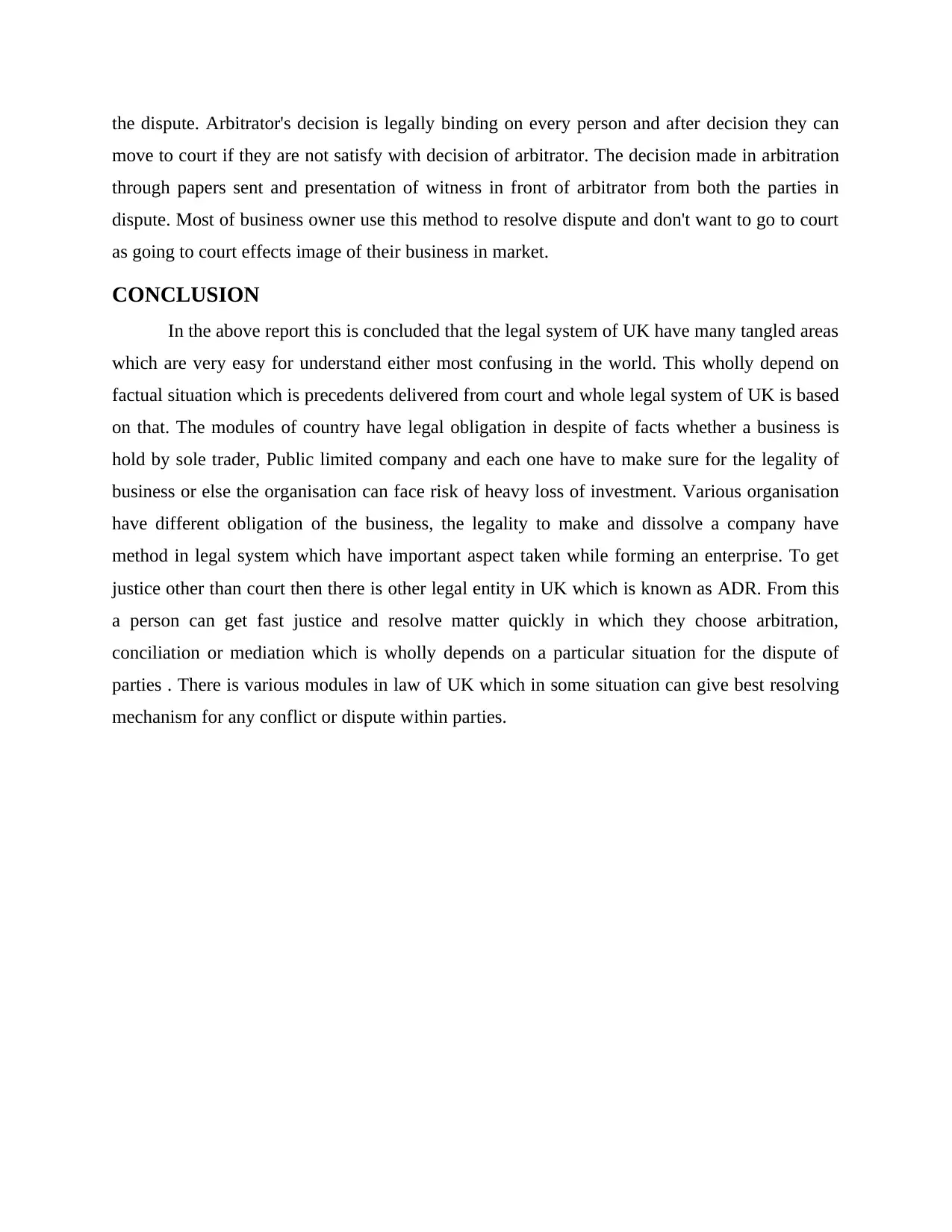
the dispute. Arbitrator's decision is legally binding on every person and after decision they can
move to court if they are not satisfy with decision of arbitrator. The decision made in arbitration
through papers sent and presentation of witness in front of arbitrator from both the parties in
dispute. Most of business owner use this method to resolve dispute and don't want to go to court
as going to court effects image of their business in market.
CONCLUSION
In the above report this is concluded that the legal system of UK have many tangled areas
which are very easy for understand either most confusing in the world. This wholly depend on
factual situation which is precedents delivered from court and whole legal system of UK is based
on that. The modules of country have legal obligation in despite of facts whether a business is
hold by sole trader, Public limited company and each one have to make sure for the legality of
business or else the organisation can face risk of heavy loss of investment. Various organisation
have different obligation of the business, the legality to make and dissolve a company have
method in legal system which have important aspect taken while forming an enterprise. To get
justice other than court then there is other legal entity in UK which is known as ADR. From this
a person can get fast justice and resolve matter quickly in which they choose arbitration,
conciliation or mediation which is wholly depends on a particular situation for the dispute of
parties . There is various modules in law of UK which in some situation can give best resolving
mechanism for any conflict or dispute within parties.
move to court if they are not satisfy with decision of arbitrator. The decision made in arbitration
through papers sent and presentation of witness in front of arbitrator from both the parties in
dispute. Most of business owner use this method to resolve dispute and don't want to go to court
as going to court effects image of their business in market.
CONCLUSION
In the above report this is concluded that the legal system of UK have many tangled areas
which are very easy for understand either most confusing in the world. This wholly depend on
factual situation which is precedents delivered from court and whole legal system of UK is based
on that. The modules of country have legal obligation in despite of facts whether a business is
hold by sole trader, Public limited company and each one have to make sure for the legality of
business or else the organisation can face risk of heavy loss of investment. Various organisation
have different obligation of the business, the legality to make and dissolve a company have
method in legal system which have important aspect taken while forming an enterprise. To get
justice other than court then there is other legal entity in UK which is known as ADR. From this
a person can get fast justice and resolve matter quickly in which they choose arbitration,
conciliation or mediation which is wholly depends on a particular situation for the dispute of
parties . There is various modules in law of UK which in some situation can give best resolving
mechanism for any conflict or dispute within parties.
⊘ This is a preview!⊘
Do you want full access?
Subscribe today to unlock all pages.

Trusted by 1+ million students worldwide
1 out of 15
Related Documents
Your All-in-One AI-Powered Toolkit for Academic Success.
+13062052269
info@desklib.com
Available 24*7 on WhatsApp / Email
![[object Object]](/_next/static/media/star-bottom.7253800d.svg)
Unlock your academic potential
Copyright © 2020–2026 A2Z Services. All Rights Reserved. Developed and managed by ZUCOL.





